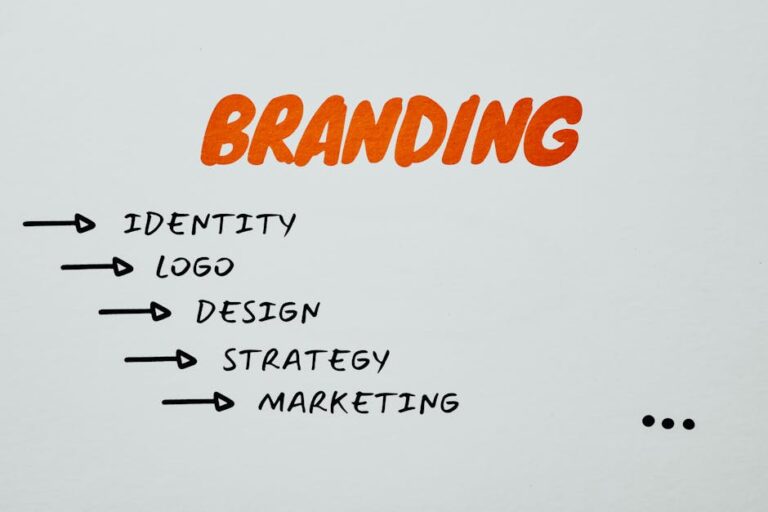Why Branding Matters: How a Strong Brand Drives Business Growth
Branding is more than just a logo or a catchy tagline—it’s the essence of how a business presents itself to the world. It encompasses everything from visual identity to messaging, customer experience, and emotional connection. In today’s highly competitive landscape, businesses that invest in strong branding are more likely to gain recognition, build trust, and drive long-term growth. Without a clear and consistent brand, even the best products or services may struggle to make an impact.
A strong brand gives businesses a distinct identity, setting them apart from competitors. It creates an emotional connection with customers, influencing their purchasing decisions and fostering long-term loyalty. Companies like Apple, Nike, and Coca-Cola have built globally recognized brands that extend beyond their products. Their branding is deeply ingrained in their values, storytelling, and customer experience, making them household names. No matter the size of your business, investing in branding is one of the most effective ways to establish credibility, attract customers, and increase profitability.
Brand Recognition: Standing Out in a Competitive Market
In a crowded market, being memorable is crucial. Customers are bombarded with countless advertisements and choices daily, making it challenging for businesses to cut through the noise. This is where branding plays a vital role. A well-established brand identity ensures that your business is instantly recognizable, even in a sea of competitors. From your logo and color palette to the tone of your messaging, consistency helps create a lasting impression.
Think about some of the most successful brands in the world. McDonald’s golden arches, Starbucks’ green mermaid, and Apple’s minimalist logo are instantly recognizable. These brands have spent years reinforcing their identity through consistent visuals, messaging, and customer experiences. Their branding is so effective that people can identify their products even without seeing the company’s name.
For small and medium-sized businesses, the goal is the same—creating a brand identity that sticks in customers’ minds. The right combination of visuals, messaging, and tone can make your business more recognizable and trustworthy. A strong brand makes marketing efforts more effective because customers are already familiar with and attracted to the company’s image. It also helps foster brand recall, where customers automatically think of a specific brand when they need a product or service in that industry.
Building Trust and Credibility
Trust is one of the most valuable assets a business can have. Consumers are more likely to buy from brands they trust, and branding plays a crucial role in establishing that trust. A strong brand signals professionalism, reliability, and quality, giving customers confidence in their purchase decisions.
One of the key ways branding builds trust is through consistency. When a business maintains a consistent visual identity, tone, and customer experience, it reassures customers that they can expect the same level of quality every time. This is especially important for online businesses where customers can’t physically interact with the product before purchasing.
Social proof also plays a significant role in credibility. When customers see positive reviews, testimonials, or user-generated content featuring a brand, they are more likely to trust it. Branding can amplify this effect by ensuring that every touchpoint—website, social media, packaging, and customer service—aligns with the company’s values and mission.
Businesses that invest in branding services create a foundation for trust that translates into customer loyalty. When people feel connected to a brand, they are more likely to return and recommend it to others. Trust leads to customer retention, and customer retention drives long-term business growth. By focusing on branding, businesses can position themselves as industry leaders while building lasting relationships with their audience.
Emotional Connection: The Key to Customer Loyalty
A successful brand isn’t just recognized—it’s felt. The most influential brands create emotional connections with their audience, making customers feel understood, valued, and even inspired. This emotional bond goes beyond a product or service; it makes people loyal to the brand itself. When customers feel emotionally connected, they are more likely to stay loyal, advocate for the brand, and make repeat purchases.
Storytelling is one of the most powerful ways to establish this connection. Instead of simply selling products, brands that tell compelling stories about their mission, values, or impact resonate more deeply with consumers. Take Nike, for example. Their marketing isn’t just about shoes—it’s about perseverance, athleticism, and achieving greatness. Every campaign taps into human emotions, making customers feel like they are part of something bigger.
To create an emotional connection, brands must identify their core values and integrate them into every aspect of their messaging. Whether it’s through social media interactions, content marketing, or customer service, every touchpoint should reinforce what the brand stands for. Customers want to support businesses that align with their beliefs, so authenticity plays a crucial role. Brands that genuinely care about their customers, rather than just selling to them, build stronger, long-lasting relationships.
In today’s market, emotional branding is no longer optional—it’s essential. Companies that understand and tap into human emotions create a loyal customer base that goes beyond simple transactions. They cultivate brand advocates who not only continue to buy but also spread the word, further strengthening the brand’s presence and credibility.
Branding’s Impact on Customer Perception and Decision-Making
Every purchasing decision is influenced by branding, whether consumers realize it or not. From the moment they encounter a brand, they form perceptions based on visuals, messaging, and overall experience. These perceptions directly impact whether they choose to engage with a company or move on to a competitor.
A well-crafted brand identity makes a strong first impression, signaling professionalism, quality, and reliability. If a brand appears disorganized, inconsistent, or outdated, potential customers may doubt its credibility. On the other hand, a cohesive brand experience builds confidence and encourages trust.
Beyond first impressions, branding shapes customer expectations. A high-end luxury brand like Chanel positions itself with premium aesthetics, elegant typography, and a sophisticated tone. Customers immediately associate it with exclusivity and quality, justifying the higher price tag. Meanwhile, a brand like IKEA emphasizes affordability, functionality, and simplicity, shaping customer expectations around accessibility and practicality.
Branding also plays a crucial role in differentiation. Consumers are faced with endless choices, and their decisions often come down to the brand that feels most aligned with their needs or values. For example, when choosing between two coffee brands, a customer might opt for the one that supports fair trade or uses sustainable packaging, simply because those values resonate with them.
Ultimately, a strong brand makes decision-making easier for customers. It reassures them that they are making the right choice by reinforcing trust, reliability, and a clear brand promise. Businesses that invest in branding ensure that customers not only recognize them but also perceive them as the best choice in their industry.
How Branding Enhances Marketing and Advertising Efforts
Branding and marketing go hand in hand. A well-defined brand provides the foundation for all marketing efforts, making campaigns more effective and impactful. Without strong branding, marketing messages can feel scattered, inconsistent, or forgettable.
One of the biggest advantages of strong branding is recognition. When customers are already familiar with a brand’s identity—its logo, colors, messaging, and tone—advertising efforts become more powerful. They don’t have to work as hard to explain who they are or what they stand for because the branding has already established that foundation. This recognition leads to increased engagement and a higher return on marketing investment.
Additionally, branding allows for more targeted and personalized marketing strategies. Companies that deeply understand their brand identity can create campaigns tailored to their ideal audience. Whether it’s through social media ads, email marketing, or influencer collaborations, a strong brand ensures that marketing messages remain consistent and relevant.
Strong branding also increases word-of-mouth marketing. Customers who connect with a brand on a deeper level are more likely to share it with their networks. Whether through social media shares, testimonials, or user-generated content, customers become brand ambassadors, expanding a brand’s reach without the need for additional advertising spend.
Marketing trends change rapidly, but a well-established brand provides long-term stability. It allows businesses to evolve their strategies without losing their core identity. Whether launching new products, entering new markets, or shifting marketing tactics, a strong brand ensures that customers remain engaged and loyal.
By integrating branding into marketing efforts, businesses can amplify their reach, attract new customers, and strengthen relationships with existing ones. In an era where consumers are constantly bombarded with content, a strong brand cuts through the noise and leaves a lasting impression.
Branding as a Differentiator: Setting Your Business Apart
In today’s oversaturated market, standing out is one of the biggest challenges businesses face. With countless competitors offering similar products or services, branding becomes the key differentiator that sets a business apart. A strong brand gives consumers a reason to choose one company over another, making differentiation essential for long-term success.
The most successful brands don’t just compete on price or features—they compete on identity. They carve out a unique space in the market by clearly defining their values, mission, and personality. For example, Apple differentiates itself through sleek design, innovation, and a user-friendly experience, while Patagonia stands out by emphasizing sustainability and ethical business practices. Both companies attract customers who align with their brand identity, not just their products.
Businesses that struggle with differentiation often lack a clear brand positioning strategy. Positioning is how a brand defines itself in relation to competitors and the value it offers to customers. A brand that tries to appeal to everyone often fails to resonate with anyone. Instead, businesses must identify what makes them unique—whether it’s their story, customer service, values, or innovation—and amplify those qualities in their branding.
When branding is done effectively, customers don’t just buy a product; they buy into a brand’s identity. They feel a connection to what the brand represents and remain loyal even when competitors offer similar products at lower prices. Differentiation through branding creates lasting customer relationships and positions a business for sustainable growth.
The Financial Benefits of Strong Branding
Beyond customer loyalty and recognition, branding has a direct impact on a company’s financial success. Businesses with strong brands tend to attract more customers, command higher prices, and increase their overall market value. A well-established brand transforms a company from a simple provider of products or services into a valuable, recognizable entity.
One of the biggest financial benefits of branding is pricing power. Consumers are willing to pay more for brands they trust and connect with. Luxury brands like Rolex and Louis Vuitton don’t justify their high prices based on functionality alone—they sell prestige, heritage, and exclusivity. Even in non-luxury markets, branding allows companies to position their products as premium, differentiating them from budget competitors.
Branding also increases customer lifetime value (CLV), which is the total revenue a business earns from a customer over their entire relationship. When customers feel emotionally invested in a brand, they are more likely to make repeat purchases, engage with loyalty programs, and recommend the brand to others. This reduces the need for constant customer acquisition, which is often more expensive than retaining existing customers.
Additionally, companies with strong brands tend to attract better investment opportunities. Investors and stakeholders see well-branded businesses as lower-risk investments because they have established customer loyalty, brand recognition, and long-term growth potential. This is why major corporations place such a high value on brand equity—the intangible asset that makes a brand valuable beyond its physical products.
Branding is not just a marketing expense; it’s an investment in the financial stability and growth of a business. Companies that prioritize branding see higher profit margins, greater customer retention, and a stronger position in the marketplace.
How to Strengthen Your Brand for Long-Term Success
Building a strong brand isn’t a one-time effort—it’s an ongoing process that requires consistency, strategy, and adaptation. Businesses that want to create a lasting brand need to focus on a few key areas to ensure their brand remains relevant and impactful.
First, define your brand’s core identity. What does your company stand for? What are its mission, values, and personality? Without a clear sense of identity, branding efforts can feel disjointed or inconsistent. Your brand’s identity should guide everything from visual design to messaging and customer interactions.
Next, ensure brand consistency across all touchpoints. Every interaction a customer has with your brand—whether through your website, social media, email campaigns, or in-store experience—should reinforce the same message and identity. Inconsistency can weaken trust and make your brand forgettable.
Engagement is another key factor. Brands that interact with their audience build stronger relationships. Whether it’s responding to customer inquiries on social media, creating personalized experiences, or launching loyalty programs, engagement fosters a sense of community. People don’t just want to buy from brands; they want to feel like they are part of them.
Finally, stay adaptable. Branding isn’t static. Consumer preferences, industry trends, and market conditions change over time. Brands that continuously evolve while staying true to their core identity remain relevant and competitive. This doesn’t mean changing your brand’s mission or values, but rather refining your strategy to meet the needs of your audience.
Investing in branding means investing in the long-term success of your business. A well-built brand creates loyal customers, generates revenue, and positions a company as a leader in its industry.
Conclusion: Why Investing in Branding Is a Smart Business Decision
Branding is one of the most powerful tools a business has for growth, recognition, and long-term success. It goes beyond logos and marketing—it’s about creating an identity that resonates with customers, builds trust, and differentiates a company from competitors. Businesses that invest in branding establish deeper connections with their audience, leading to greater customer loyalty and higher profitability.
A strong brand provides financial advantages, from increased pricing power to higher customer lifetime value. It makes marketing efforts more effective, allowing businesses to spend less on advertising while still attracting and retaining customers. Branding also positions a company as an industry leader, making it more attractive to investors, partners, and employees.
For businesses looking to grow, the decision to invest in branding should not be an afterthought. Whether you’re a startup or an established company, strengthening your brand is essential for staying relevant and competitive. The most successful brands in the world aren’t just selling products—they’re selling an experience, a belief, and a community. Businesses that embrace branding as a strategic priority will not only survive but thrive in an ever-changing marketplace.

















